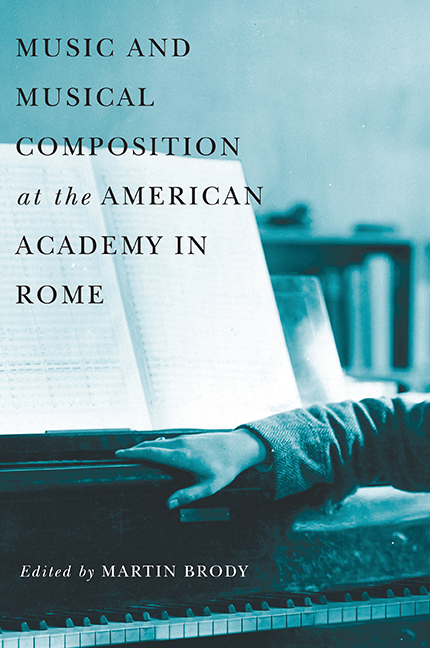Book contents
- Frontmatter
- Contents
- List of Illustrations
- Introduction
- Part One A History of the Rome Prize
- Part Two Origins, Ideology, Patronage
- Part Three Two Case Studies in Internationalism
- Part Four Primary Sources
- 7 What They Said: American Composers on Rome
- 8 The New Music Scene in Rome and the American Presence since World War II: Excerpts from a Roundtable, Moderated by Richard Trythall
- 9 For the Academy
- 10 Two Visits in 1981
- 11 Music Resources at the American Academy in Rome
- Appendix: Composers at the American Academy in Rome, 1921–40
- Selected Bibliography
- List of Contributors
- Index
9 - For the Academy
from Part Four - Primary Sources
Published online by Cambridge University Press: 25 October 2017
- Frontmatter
- Contents
- List of Illustrations
- Introduction
- Part One A History of the Rome Prize
- Part Two Origins, Ideology, Patronage
- Part Three Two Case Studies in Internationalism
- Part Four Primary Sources
- 7 What They Said: American Composers on Rome
- 8 The New Music Scene in Rome and the American Presence since World War II: Excerpts from a Roundtable, Moderated by Richard Trythall
- 9 For the Academy
- 10 Two Visits in 1981
- 11 Music Resources at the American Academy in Rome
- Appendix: Composers at the American Academy in Rome, 1921–40
- Selected Bibliography
- List of Contributors
- Index
Summary
Great gratitude to the American Academy—without its generosity I would not have been able to complete many of my larger compositions, and without it I could not have grown to know so much of Italy and made so many Italian friends.
Over the years I was also able to visit a vast number of important sites so meaningful to me: Greece, Crete, Sicily—Siracusa, Agrigento, Segesta, Florence, Siena, Perugia, and many others.
In 1953 my wife, young son, and I arrived in Italy on a steamship bringing us from New York to Naples. I myself had come to Rome with my mother in the early twenties, and again in the thirties during an Anno Santo. And then again during an Easter when my teacher, Nadia Boulanger, was there—for my interest in Italy sometimes overpowered my antifascist leanings. When the three of us arrived in Naples in 1953, we were picked up by, I think, Nicolo, a driver from the Academy, and driven to Rome. At once I learned from the secretary of the director, Laurance Roberts—the Principessa Rospigliosi—that we could not stay as a family there but had to fi nd an apartment for ourselves. After meeting the other musical fellows, Frank Wigglesworth and Yehudi Wyner, who were already friends, we were driven into the city and put up in the Hotel Inghelterra, a fl eabag then, but very grand now. After a month of real estate wonderings, we found a nice apartment near the Piazza Fiume—via Trebbia 3, the rental of which was more than the allowance the Academy gave me and was an hour's ride on bus 75 to my ground fl oor studio in the Academy's Casa Rustica. The studio came with a piano and a leaky roof.
At the time the Academy was still recovering from World War II, during which it was closed and many beds, etc., were stolen. Roberts had replaced these with beds bought at the Porta Portese fl ea market. The help at the time lived in small accommodations in the basement of the Academy building.
- Type
- Chapter
- Information
- Music and Musical Composition at the American Academy in Rome , pp. 276 - 278Publisher: Boydell & BrewerPrint publication year: 2014

